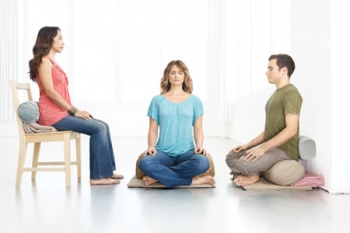For those who have experienced meditation I think we might all be able to relate with the following situation. We are sitting in a meditation hall or temple and the instructor has just started a period of meditation. At first the experience is quite relaxing...It is quiet, the cushion is pleasantly soft, the smell of a beautiful jasmine incense stick wafts in the air and the practice of calmly observing our breath brings some light relaxation. However, soon we begin to develop pains in our legs. The cushion that was once soft feels as uncomfortable as stone. The jasmine scent begins to mix with the odour of our fellow meditators’ socks. We sneakily open an eyelid just to check if everyone else is really doing what we are. We wonder how long there is left to go. Even the slightest movement from the instructor brings us hope that she or he might be about to arise out of blissful concentration and end our agony by finishing the session! The list could go on.
In my first few troubled months of meditation, I would often question the purpose of putting myself through what essentially was an unpleasant experience. I began to reconsider what I thought to be the goals of meditation and over the years I have developed on these basic thoughts and will share them here. My initial approach to meditation was certainly based on an enthusiasm for particular mental states that I thought I could obtain in the practice. I was looking for peace, happiness, joy and security. I sat down determined to attain the bliss of a Buddha and ended up with numb legs and a lot of disappointment! I was fixated on what I would attain within meditation. During this period, I was fortunate enough to enrol on a meditation course at a forest monastery in Thailand.
I had a conversation with the ageing abbot of the monastery about my problems in attaining the blissful states I desired. The abbot said that I should relax and let go of my desire for bliss in meditation. Bliss only arises when we are no longer attached to it.
This conversation, based on the centrality of “letting-go” in meditation, led me to reconsider everything that I was doing. I focused on the teaching of “letting-go” in Buddhism and the idea that the more we relinquish attachment to perceptions and possessions the less we will suffer. I began to view the whole practice of meditation as part of this process of letting-go and abandoning. I changed my focus from contemplating the goal of meditation to the question: “What do we give up during meditation?” For instance, when we allocate a part of our day for meditation essentially we are giving up our time and our control of time. For many people giving up even 20 minutes per day for meditation is a large sacrifice. Also, when we sit during meditation, we give up our desire for space and movement. When we close our eyes we relinquish the desire to see and to perceive objects of beauty and interest. When we focus on our breath we abandon the need to engage in discursive thinking and day-dreaming. Eventually our breath may become very fine, so fine that we cannot even feel it any more. At this point we have abandoned the sense of touch and may use a feeling of joy as a new meditation object.
Eventually, some meditators may even abandon these aspects of the mind too and delve further into the whirlpool of letting-go. When we take this view of meditation any feeling that can be said to be “gained” is in fact only a by-product of the central practice of abandoning. The idea of a good and bad meditation session becomes irrelevant since merely sitting down for a minute constitutes a letting-go of our need to control time and space. The more we worry about what “happens” during the session the further we move away from our practice of abandoning. In this way, judging meditation by what it allowed me to give up, rather than gain, certainly helped me overcome the highs and lows of a results based approach to meditation.

















